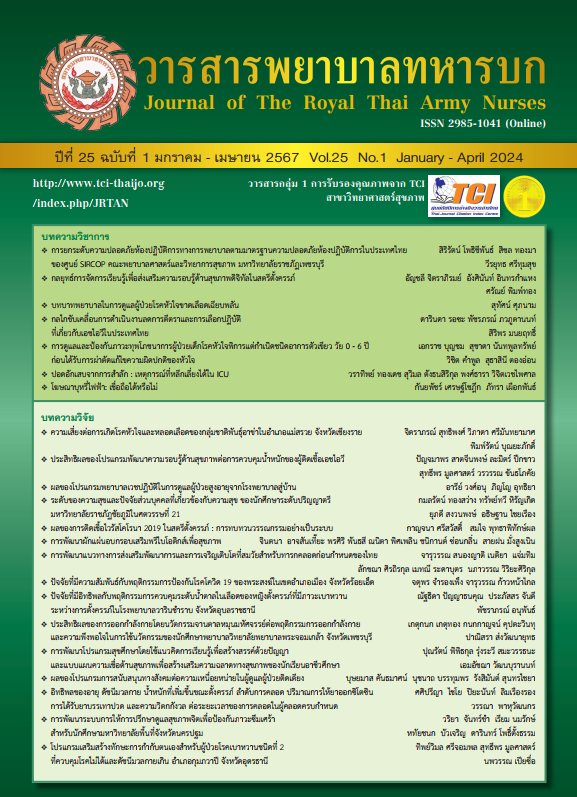Nurse’s Role in Caring for Patients with Acute Coronary Syndrome
Keywords:
Acute Coronary Syndrome, Nursing care, AdviceAbstract
Acute Coronary Syndrome (ACS) refers to a life-threatening concern caused by anomalies in the blood vessels that supply the heart muscle. This leads to narrowing, blockage, or rupture, resulting in insufficient blood flow to the heart muscle and eventually ACS and myocardial infarction. Acute coronary syndrome is the most occurs in males more than females who are 20 years old and above and have co-morbidity including inappropriate healthcare behaviors that cause acute coronary syndrome. Therefore, nurses play a significant role in caring for patients with acute coronary syndrome starting from crisis until the rehabilitation period. The role of nurses was identified in changing patient behavior after having acute coronary syndrome and supporting the patient’s family participation in patient care for patients to change their self-management behaviors after acute coronary syndrome to be correct, help them to achieve a better quality of life, and suitable to reduce the risk of recurrence and re-hospitalization.
Downloads
References
World Health Organization. World health statistic of cardiovascular disease. Monitoring health for the Sustainable Development Goals. 2020;7(16):109-12.
Strategic and Planning Division Office of the Permanent Secretary Ministry of Public Health. Public health statistic. Journal of The ministry of Public Health. 2021;32(3):10-23. (In Thai)
The Heart Association of Thailand under The Royal Patronage of H.M. The King. Thai chronic coronary syndrome guideline. 2nd ed. Cositchaipat J, editor. Bangkok: Next step designs; 2021. (In Thai)
American Heart Association. Guildeline for the management of patient with acute coronary syndrome. Journal of American College of Cardiology. 2020;25(3):128-43.
Di L, Niccoli G, Porto I, Vergallo R, Gatto L, Prati F, et al. Recurrent acute coronary syndrome and mechanisms of plaque instability. International Journal of Cardiology. 2017; 243:98-102.
Bueno H, Martin R. Long-term Cardiovascular Risk After Acute Coronary Syndrome, An Ongoing Challenge. Revista Espanola de Cardiology. 2016;69(1):1-2.
Supanam S, Liangchawengwong S, Piyayotai D. The factors predicting post-hospital discharge chest pain status among acute coronary syndrome patients during the first year. Journal of The Royal Thai Army Nurses. 2020;21(2):283-92. (in Thai)
European Society of Cardiology. The pathophysiology of acute coronary syndromes. Annals of Translational Medicine. 2020;3(14):271-3.
American Heart Association. Symptom and diagnosis of acute coronary syndrome. Annals of Translational Medicine. 2020;8(14):252-6
American Heart Association. Epidemiology of coronary heart disease and acute coronary syndrome. Annals of Translational Medicine. 2020;7(14):272-6.
Wright EA, Steinhubl SR, Jones JB, Barua P, Yan X, Van LR, et al. Medication burden in patients with acute coronary syndromes. American Journal Managed Care. 2017;23(4):106-12.
Division of Non-communicable diseasas. Non-communicable diseasas statistic. (2021). (in Thai)
Donna S, Workman Y. Prevention of cardiovascular disease in adults. Journal of the American College of Cardiology. 2015;38(7):1787-821.
Mottillo S, Filion KB, Genest J, Joseph L, Pilote L, Poirier P, et al. Metabolic syndrome and cardiovascular risk. Journal of American College of Cardiology. 2014;59(7):635-43.
Eckel RH, Jakicic JM, Ard JD, Miller NH, Hubbard VS, Lee I, et al. Guidelines on lifestyle management to reduce cardiovascular risk. Journal of American College of Cardiology. 2013;63(25):2960-84.
Denollet J, Sys SU, Stroobant N, Rombouts H, Gillebert TC, Brutsaert DL. Personality as independent predictor of long-term mortality in patients with coronary heart disease. The Lancet. 2014;347(8999):417-21.
Ambrose JA, Singh M. Pathophysiology of coronary artery disease leading to acute coronary syndromes. Prime Reports. 2015; 7(8):102-5.
Meister RE, Weber T, Princip M, Schnyder U, Bart J, Znoj H, et al. Resilience as a correlate of acute stress disorder symptoms in patients with acute myocardial infarction. Journal of open Heart. 2015;34(3):1-7.
Broecke S, Jobard O, Montalescot G, Bruyneel M, Ninane V, Arnulf I, et al. Very early screening for sleep-disordered breathing in acute coronary syndrome in patients without acute heart failure. Journal of Clinical Sleep Medicine. 2014;15(12):1539-46.
Niakan M, Paryad E, Leili KE, Sheikholeslami F. Depressive symptoms effect on self care behavior during the first month after myocardial infarction. Journal of Psychiatric Nursing. 2015;7(4):382-91.
Chiaranai C, Doommai N, Chularee S. Nursing care of patients with acute coronary syndrome undergoing percutaneous coronary intervention: a case study. Thai Journal of Cardio-Thoracic Nursing. 2023; 34(1):2-15. (In Thai)
Panattoni G, Monzo L, Gugliotta M, Proietti G, Tatangelo M, Jacomelli I, et al. Optimal management of patients after acute coronary syndrome. European Heart Journal Supplements. 2023;25(3):84–9.
Downloads
Published
How to Cite
Issue
Section
License
Copyright (c) 2024 Journal of The Royal Thai Army Nurses

This work is licensed under a Creative Commons Attribution-NonCommercial-NoDerivatives 4.0 International License.
บทความหรือข้อคิดเห็นใดใดที่ปรากฏในวารสารพยาบาลทหารบกเป็นวรรณกรรมของผู้เขียน ซึ่งบรรณาธิการหรือสมาคมพยาบาลทหารบก ไม่จำเป็นต้องเห็นด้วย
บทความที่ได้รับการตีพิมพ์เป็นลิขสิทธิ์ของวารสารพยาบาลทหารบก
The ideas and opinions expressed in the Journal of The Royal Thai Army Nurses are those of the authors and not necessarily those
of the editor or Royal Thai Army Nurses Association.






